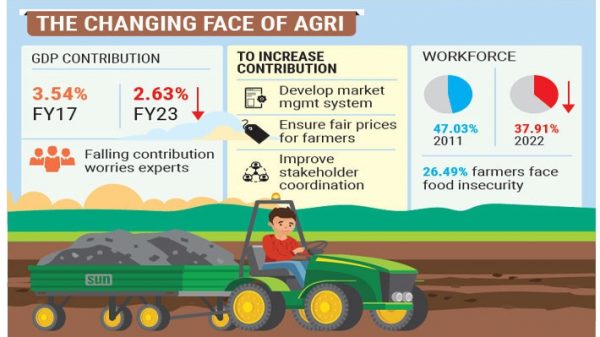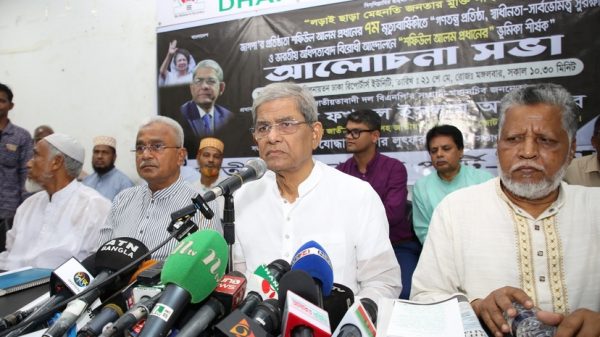Economy grows, agriculture falters

Shawdesh Desk:
The hum of industries now drowns out the clinking of hoes – agriculture, once the backbone of the country’s economy, is now at a crossroad. While the economy, as a whole, has developed over the years, agriculture’s contribution to GDP has shrunk dramatically, leading to job losses and sparking fears of potential food shortages.
With more people leaving farming and imports on the rise, concrete steps aimed at revitalising the sector should be a priority, according to industry insiders. As Bangladesh navigates these challenges the agricultural sector is facing, the formulation and implementation of strategic policies, coupled with stakeholders’ collaboration, will be crucial for ensuring the sector’s sustainability, said economists.
The agricultural sector’s contribution to the GDP has gradually declined from 3.54% in FY2016-17 to 2.63% in FY2022-23. In contrast, the industrial and services sectors displayed better growth patterns during the same period. The industrial sector witnessed varying growth rates over the past few fiscal years reaching a peak of 11.69% in FY2019, according to the Bangladesh Bureau of Statistics (BBS) data. However, with growth rates of 11.49%, 9.9% and 8.75% in FY21,FY22 and FY23 respectively, the sector’s trajectory prompts a closer examination of its role in the evolving economic landscape.
The services sector demonstrated a more stable trajectory, in comparison, registering a growth rate of 6.55% in FY17, 6.58% in FY18 and 6.93% in FY19. The sector’s growth has since been steady as it continued to hover around 6% every fiscal year except for the covid-hit FY20 with 5.77% in FY23. The overall GDP growth of the country remained resilient, standing at 6.24% in FY2022-23.
Agricultural exodus
Farmers are leaving the agricultural profession, citing reasons including social inequality, financial insecurity, dependence on food imports, and perceived inadequacies in the sector’s support measures. This trend raises concerns about a potential future food shortage, experts opined.
The number of farmers in Bangladesh has decreased significantly over the past 11 years, declining by 9.13%. Infrastructure development, increased agricultural input prices, and volatility due to import dependence contribute to this decline.
The recently released Population and Housing Census of 2022 highlights a substantial shift in the country’s workforce composition. Over the span of a decade, the percentage of citizens engaged in agriculture has witnessed a notable decrease – dropping from 47.03% in 2011 to 37.91% in 2022.
In contrast, both the industrial and service sectors have experienced a significant uptick in their workforce. The industrial sector’s share increased from 14.92% in 2011 to 18.40% in 2022, indicating a growing presence in the nation’s economic landscape.
Similarly, the service sector’s workforce composition rose from 38.04% in 2011 to a substantial 43.70% in 2022.
This shift in workforce dynamics suggests a transformative period in Bangladesh’s economic structure, marked by a decreasing reliance on agriculture and an increasing prominence of industrial and service-oriented activities. The implications of these changes warrant a closer examination, considering their potential impact on economic stability, employment patterns, and overall national development, according to experts.
On the other hand, a considerable 21.91% of households in Bangladesh are grappling with food insecurity, according to the BBS’s key findings report on “Food Security Statistics 2023”.
Interestingly, farmers, who play a pivotal role in food production, face a higher rate of food insecurity at 26.49%, the report mentioned.
Professionals in the industrial sector exhibit the least food insecurity at 16.64% and the rate is 20.28% in the service sector, emphasising income disparities.
Besides, the country’s continued reliance on imports for essential products underscores the need for agricultural diversification and increased productivity.
Speaking with the Daily Sun, Dr Zahid Hussain, former lead economist at the World Bank’s Dhaka office, attributed the decreasing agricultural workforce to lower wages compared to the industrial sector. He emphasised the need to increase wages and develop a more productive industrial module system.
Dr Ahsan H Mansur, a prominent economist and the executive director of the Policy Research Institute of Bangladesh (PRI), pointed out that the commercial cultivation of various products with modern equipment, coupled with a decline in kitchen gardens, is impacting traditional farming.
Moreover, the reluctance of educated individuals to engage in agriculture is contributing to a reduction in the number of farmers, according to Dr Mansur.
Speaking to the Daily Sun, Professor Mustafizur Rahman, a distinguished fellow of the Centre for Policy Dialogue (CPD), expressed concern over the declining contribution of agriculture to GDP despite its significant growth potential. He stressed the need to diversify products and enhance productivity to reduce import reliance.
Additionally, Professor Rahman emphasised the importance of the government’s attention to the market management system to ensure fair prices for farmers. While acknowledging the organised marketing system in cities, he highlighted the inefficiencies in the market system in villages that need improvement.
Professor Abu Noman Farooq Ahmed pointed out that the influence of mechanisation, a global decline in farming interest, and the rise of commercial agriculture mark a transformative period.
Ahmed, professor in the Department of Plant Pathology, Faculty of Agriculture, Sher-e-Bangla Agricultural University, emphasises the need for a comprehensive strategy that addresses mechanisation impacts, encourages the return of educated individuals to agriculture, and tackles challenges faced by traditional farmers.
Stakeholders’ coordination is vital for the sector’s sustainability, he added.























Leave a Reply